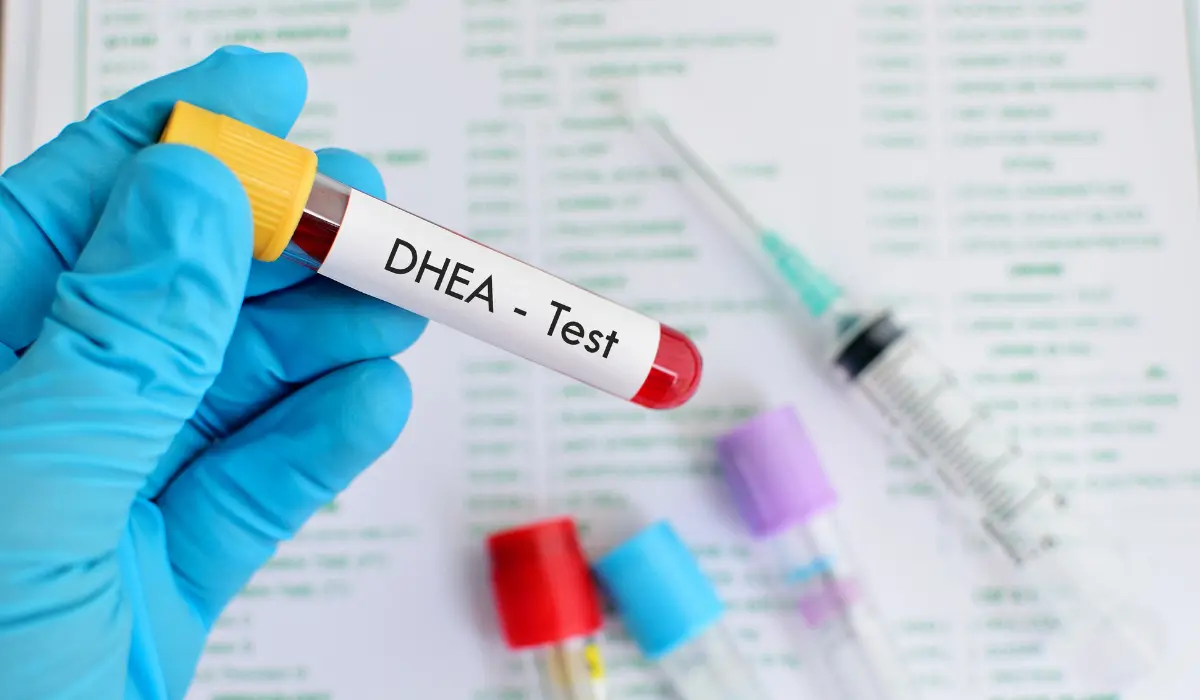What hormone is DHEA? Well, located on top of the kidney, the adrenal glands naturally produce the steroid hormone DHEA. DHEA normally peaks in the middle to late 20s and then declines naturally after 30 years of age.
These hormones function as markers for the male and female hormones testosterone and estrogen. Dehydroepiandrosterone (DHEA) is normally a pro-hormone; if it starts to decline, people may need to take supplements.
DHEA supplements are frequently prescribed by a doctor and are given to people who have thinned vaginal tissue.
What Is the Benefit of Taking Hormone Is DHEA?
The benefits of using DHEA (Dehydroepiandrosterone) supplements on hormonal balances and general health are well-known.
Even though many countries sell it as an over-the-counter supplement, it is best to only use it under expert supervision.
The following are a few typical applications for the DHEA hormone supplement:
Hormone DHEA Dosage
The dosage of a DHEA (dehydroepiandrosterone) hormone supplement can be tricky to figure out. Before recommending a dosage, a healthcare provider takes into account several factors, such as age, health, gender, and other requirements.
This is a general guideline, but considering the potential side effects, DHEA Hormone supplement dosage should be strictly prescription-based:

Advantages of DHEA Hormone
Supplements containing DHEA (dehydroepiandrosterone) hormone have several possible advantages, though each person’s reaction may differ. Among the typical advantages are the following:
Anti-Aging Effects: Owing to its function as a hormone precursor, DHEA might have some anti-aging benefits.
Hormonal Balancing: Likewise, as a precursor to hormones, DHEA can help correct imbalances in estrogen and testosterone. However, each person may experience the impact differently, and not everyone will benefit equally.
Support for the Immune System: There is evidence to support a link between enhanced immune function and DHEA.
Increased Muscle Mass and Bone Density: Owing to its correlation with anti-aging properties, DHEA could potentially aid in enhancing bone density. It might even lessen the chance of fractures in addition to age-related bone diseases and disorders. Additionally, DHEA may enhance the recovery of muscles following rigorous physical training.
Defense Against Depression, Anxiety, And Stress: Certain studies suggest that DHEA may enhance emotional stability, which lowers the risk of stress, anxiety, and depression. Nevertheless, the claims lack conclusive evidence.
Reduces Inflammation: Because DHEA supplements contain specific hormones, they may reduce inflammation and stop autoimmune reactions.
Promotes Loss of Weight: DHEA supplements may help increase metabolism, preventing weight gain and muscle loss that often occurs with aging, particularly in women.
Enhances Sexual Orientation: Supplementing with DHEA may help with sexual dysfunction and decreased libido.
Reduces Diabetes Risk: DHEA supplements are linked to a lower risk of diabetes because they may play a role in glucose metabolism.
DHEA Hormone Side Effects
The following are potential side effects of DHEA (dehydroepiandrosterone):
- Increased oiliness of the skin, particularly on the face.
- acne on the face or occasionally even the body.
- Loss of motion, stomach pain, and other digestive problems.
- anomalies in women’s menstrual cycles.
- Mood fluctuations or an effect on the emotional health of women who are menstruating.
- growth of facial hair, a deeper voice, and other characteristics associated with men in women.
- Men’s development of breast tissue, or gynecomastia.
- abnormal expansion of the breasts in females.
- hypertension, or elevated blood pressure, irrespective of gender.
Who Must Steer Clear of DHEA Supplements?
- People under 30 don’t need supplements because their bodies can naturally produce enough DHEA.
- Since DHEA supplements raise estrogen levels linked to an increased risk, they are generally not recommended for women who already have breast cancer. It is necessary for women who have a genetic predisposition to breast cancer to refrain from consuming DHEA supplements.
- Men who have prostate cancer or other conditions similar to it should not take DHEA supplements as they may interfere with treatment.
- Women who are nursing or pregnant should not take DHEA supplements.
Hormone Is DHEA: Conclusion
Many choose to use supplements because the production of DHEA may decrease with age, especially after the age of thirty.
But not everyone needs DHEA supplements, so it’s best to get professional advice from an endocrinologist or gynecologist. Though it has advantages, DHEA supplements have some short- and long-term side effects, so use caution when using them. Hormone Is DHEA
References:
- Bentley C, et al. (2019). Dehydroepiandrosterone: A potential therapeutic agent in the treatment and rehabilitation of traumatically injured patients. DOI:
https://doi.org/10.1186/s41038-019-0158-z - Adrenocorticalcarcinoma treatment (PDQ®) – Patient version. (2018).
https://www.cancer.gov/types/adrenocortical/patient/adrenocortical-treatment-pdq

